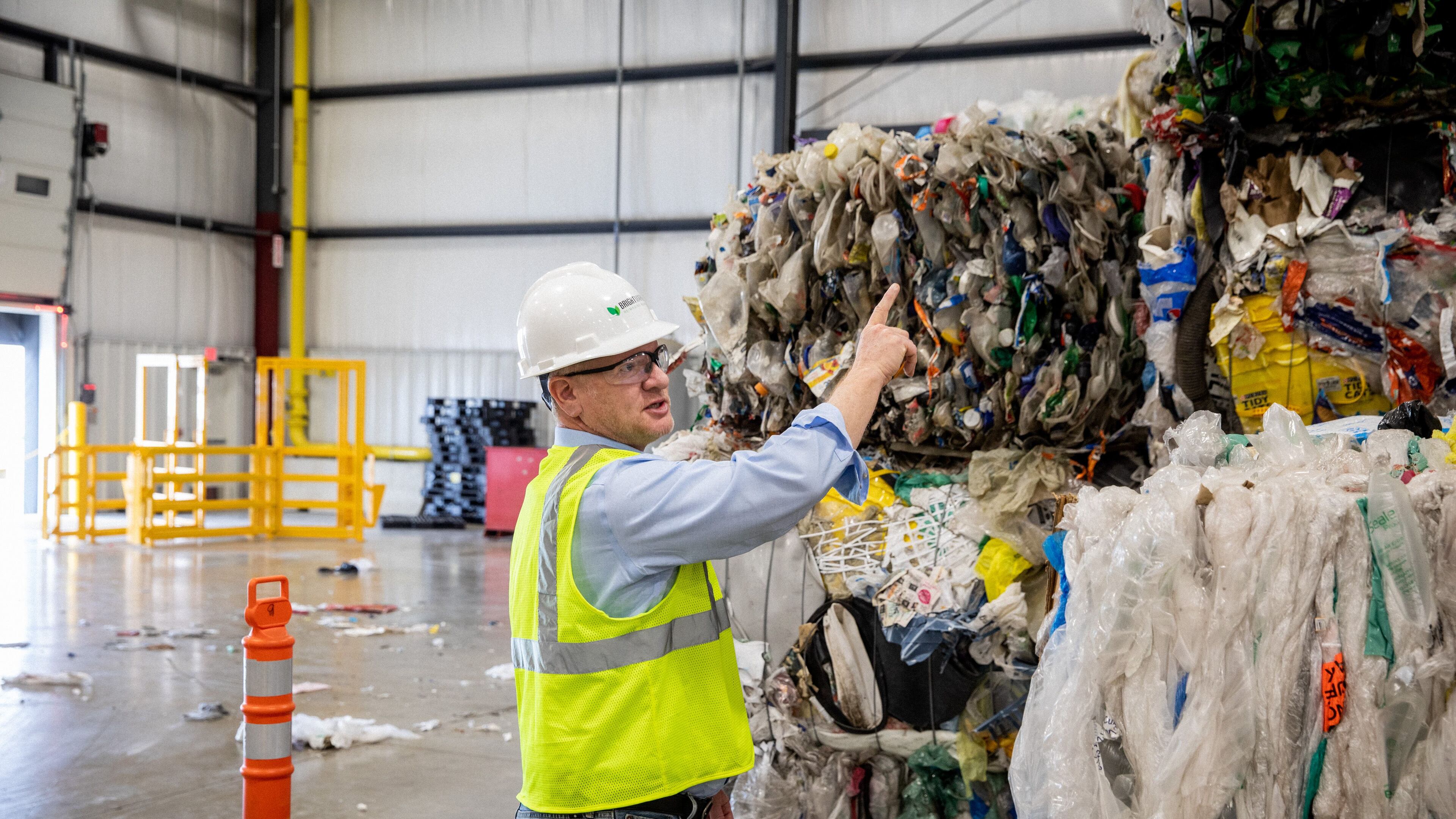Massive Georgia plant to turn plastic into fuels, chemicals

A San Francisco company says it will build the nation’s largest plastic waste processing plant outside of Macon, a facility that eventually could offer a solution to one of the country’s most visible and pressing environmental problems — plastic pollution.
Brightmark, which markets itself as a company that’s renewing the world by finding solutions to environmental challenges, plans to initially turn plastic waste into diesel fuel and chemicals. But it says the long-term goal is to create new plastic from old.
If successful at bringing plastic into full recyclability, the massive plant will put Georgia on the cutting edge of an industry with high growth potential, which excites the state and local officials who recruited Brightmark with $82 million in incentives.
But some people have their doubts that the company will be as green as its promises.
Critics say Brightmark is giving an illusion of recycling while providing cover for plastic makers. Efforts to recycle used plastic into new plastic on an industrial scale in an economically feasible way have been fraught with problems, they say. Instead of finding alternatives, plastic makers will continue pumping out tens of millions of tons of their single-use products.
“We are building an industry that requires us to continue feeding it,” said Jennette Gayer with the group Environment Georgia.
The good, the bad and the ugly
Plastic has been a blessing and a curse on modern life.
It’s light and endlessly malleable. It can be puffed into Styrofoam packing peanuts or formed into a medical device that remains in a body for years. It’s tough enough to store harsh chemicals for decades without breaking down.
But the durability that makes it so useful also makes it nearly indestructible without intervention.
It takes about 10 grams — less than the weight of two quarters — of polyethylene terephthalate, commonly called PET, to make a half-liter drink bottle. That tiny amount will take anywhere from 70 to 450 years to break down naturally, depending on exposure to sunlight and other factors, according to estimates from a variety of environmental, industrial and scientific groups

Recycling could be the answer to the problem, but it’s complicated for a number of reasons. There are seven categories of plastics that are different on molecular levels. They often can’t be mixed when recycling. And mechanical recycling processes degrade plastic’s composition, limiting its uses.
Of the seven categories, only two types of plastics are easily recycled and have ready buyers. There is little market for the rest. So, despite the best intentions of environmentally conscious families, most of the plastics packed into recycling bins are sent to landfills.
Another deterrent to recycling is that it has been cheaper to make new plastic.
That results in a massive problem. The Environmental Protection Agency estimates the U.S. produced 35.7 million tons of plastic in 2018 — the amount increases each year — but only 9% got recycled. About 5.6 million tons were burned to create energy, releasing greenhouse and toxic gases. And 27 million tons were buried in landfills or ended up in gutters, rivers and oceans.
It’s an issue that affects big cities, small towns and the companies whose brands are emblazoned on bottles, Styrofoam beer chests and food wrappers that end up floating from the coves of Lake Lanier to the beaches of Tybee Island. Public pressure and fear of regulation have spurred big users like the Atlanta-based Coca-Cola Company to pledge to find alternatives and to invest in recycling, which so far hasn’t yielded much success.
Coke invested $60 million in a South Carolina plant that aimed to recycle one type of plastic, polyethylene terephthalate, into new bottles in 2009. But Coke eventually divested itself of the troubled operation in 2011. Other national and international companies have made similar efforts, most of which produced little or poor results.
Good intentions and high tech dreams
Bob Powell, a Georgia Tech engineering and MBA graduate, founded Brightmark in 2016 with the idea of doing good and doing well by solving environmental problems for profits.
The company and its partners started by designing and operating nine industrial-sized processing facilities from Florida to Washington state that collect cow and chicken farm wastes and turn it into natural gas. The gas is sold into local or regional pipelines, and the processed wastes become fertilizer or compost.
The company moved into plastics and built its first processing plant last year in Indiana. It is one-quarter the size of the planned Georgia facility and will take in about 100,000 tons of plastic yearly. The Macon plant, which will be situated on industrial land near Middle Georgia Regional Airport and will employ more than 100 people, will haul in 400,000 tons of plastic from the region and surrounding states annually.
Brightmark uses chemical processes to break down plastic. It is one of a growing number of new companies moving into that trail-blazing, high-tech niche. Others are Loop Industries in Canada, Agilyx in the U.S. and Nexus Fuels, a smaller Cobb County firm that is financed in part by Cox Enterprises, the parent company of The Atlanta Journal-Constitution.
Brightmark uses a process called pyrolysis — heating plastic wastes in a closed container with no oxygen to vaporize it. It can mix in all types of plastics, solving one of the problems with recycling.
“It’s like a fancy distillery,” said Powell.

The plastic vapor is condensed into an oil. The oil will be further refined on site into 20 million gallons of wax and 64 million gallons of low-sulfur diesel fuel and naptha, which can be used to make gasoline, solvents or plastic.
“I think we are on a journey … and we keep getting better and better,” Powell said. Brightmark’s $460 million Georgia plant will keep millions of tons of plastic from going to landfills while making useful products, he said.
While it’s not recycling in the true sense, “that is better than where we are right now,” he said.
The oil it makes can be processed into new plastics, but that industry is in its early stages of development in the U.S., and Brightmark does not have a buyer with plans to make plastic. Some European companies are beginning to try that. Mondelez International, the food firm, says it will put Philadelphia brand cream cheese in tubs made of recycled plastic by 2022.
Powell said, “When we have a customer, we would like to tell the world publicly that we are going to make plastic out of plastic.”
Stephen Adams, executive director of the Macon/Bibb County Industrial Authority, said construction on the plant should begin next year. Powell said it could take two to three years to complete.
Brightmark has applied for a permit from the state Environmental Protection Division that will allow it to release emissions — including carbon monoxide, nitrous oxides, volatile organic compounds and other pollutants — that fall within state and federal guidelines.
Emissions in Indiana are roughly equal to what a large hospital would release, according to a study Brightmark paid for.
Not solving the problem
The California-based environmental group Global Alliance for Incinerator Alternatives criticized the new processes, including pyrolysis in a June 2020 analysis.
The processes release toxic chemicals into the air and contribute to greenhouse gases by creating fuels. “Rather than limiting production or contributing to circularity, chemical recycling provides an excuse to increase the production and disposal of plastic,” the report says.
In the last decade, companies have failed technologically and economically when they’ve tried to use processes like pyrolysis to make new plastics, it says. Those problems continue into the present.
Coke made another attempt to find bottles made from recycled plastic and had a contract with Loop Industries, which planned to make them using a similar method. But Coke walked away from the deal last October.
“Loop did not satisfy the production milestone within the agreement, and the decision was made to terminate the framework agreement in 2020,” Coke spokesman Scott Leith told the AJC.
Late last year, Loop was hit with class-action lawsuits from investors who allege the company made false or misleading statements about its work and misrepresented the results of Loop’s proprietary process. The Securities and Exchange Commission also launched an investigation into the company.
A Loop spokesman told the AJC the company had no comment about the allegations or investigation.
Powell said Brightmark already sells all the oil it can produce, though he declined to disclose whether the private company is profitable. It has partners such as oil industry giant BP.
Gayer, from Environment Georgia, said, “This chemical recycling is not really a solution to the plastic pollution crisis we are facing, and might be seen as a distraction.”
She expressed concerns about the $82 million in incentives that Georgia has promised Brightmark to build here, given the newness of the technology and unproven market.
Pat Wilson, the head of the Georgia Department of Economic Development, said Brightmark already has a plant up and running. The department used experts from Georgia universities to vet the industry. Members from the Macon/Bibb County Industrial Authority visited the Indiana plant.
“We have really done our due diligence,” he said.
“This is a technology that can be transformational in how we deal with this massive problem of plastics in society,” he said.
Producing fuels from plastic is marginally better for the environment than simply burying it, said David Shonnard, a Michigan Technological University professor who is researching pyrolysis of plastics.
He said it is feasible but optimistic that maybe half of the plastics the U.S. produces could be processed into fuels or new plastics in five years. Big companies are just beginning to scale up, like the $250 million Eastman Chemical plant in Tennessee, which will chemically break down polyethylene terephthalate into building blocks for new plastic. If plants like that are successful, it could spur more plastic recycling.
But the final solution is not just a matter of chemistry. The plastics crisis is a “wicked problem,” Shonnard said — a science term used to describe highly complex problems that involve incalculable risks. And addressing it will require examining social policy, the economics and industrial solutions.
Time will tell whether Brightmark and similar ventures will fulfill their promises and the fledgling industry takes wing.
“Probably the market is waiting to see whether those are successful or not,” Shonnard said.



